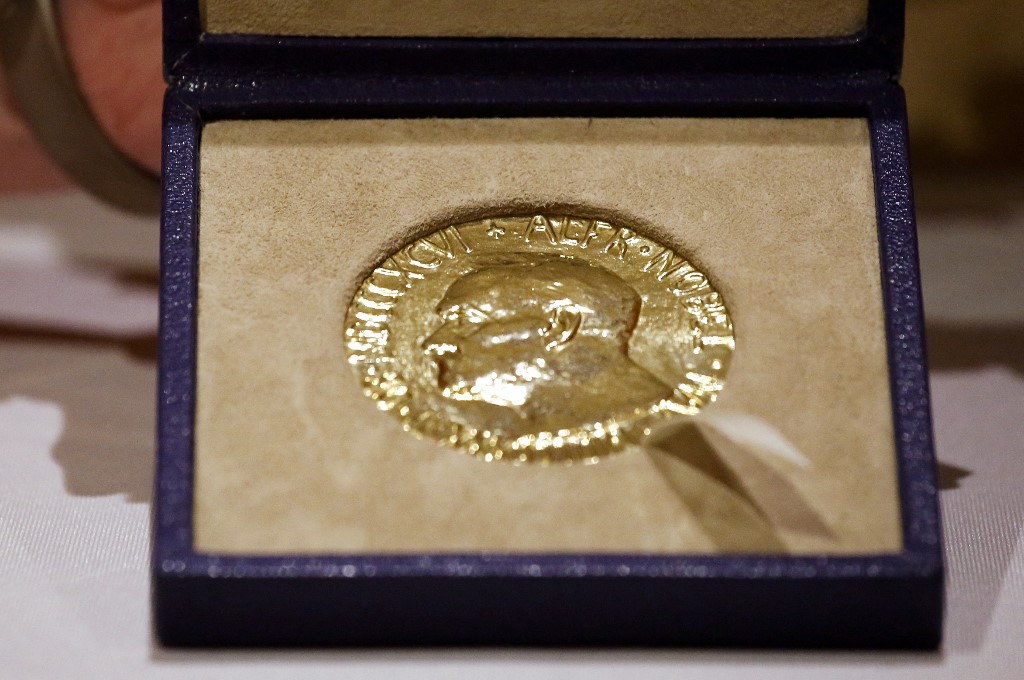With war in Ukraine, coups in Africa, and flaring geopolitical tensions, who in our “dysfunctional” global family, to use the words of the UN secretary general, could win this year’s Nobel Peace Prize?
The much-anticipated prize, the highlight of the Nobel season, will be announced on Friday in Oslo.
But the bleak state of world affairs has made it unusually difficult to speculate on possible contenders this year.
“The sad truth is that not a lot of peace is being made in the world in 2023,” Dan Smith, the head of the Stockholm International Peace Research Institute (SIPRI), told AFP.
“There are now almost twice as many wars as there were in 2010, for example.
“So I don’t think there is a peacemaker to be found for the Nobel Peace Prize this year.”
Last year, against the backdrop of the war in Ukraine, the prize went to a symbolic trio — Russian human rights group Memorial, Ukraine’s Center for Civil Liberties, and jailed Belarusian rights advocate Ales Bialiatski.
All three represent the nations at the center of the war in Ukraine, which they oppose.
After honoring another Kremlin critic the previous year — Russian journalist Dmitry Muratov, who shared the prize with his Philippine colleague Maria Ressa — the Nobel committee could decide to turn its spotlight on another geographical region.
Some experts point to the Iranian women demonstrating their anger — some dropping their hijabs — over the death in custody of Mahsa Amini in Tehran a year ago.
Or those fighting for women’s rights, in particular education, in countries where these are being trampled.
The head of the Peace Research Institute of Oslo, Henrik Urdal, said he would like to see the prize awarded jointly to jailed Iranian women’s rights campaigner Narges Mohammadi and her Afghan counterpart Mahbouba Seraj.
Both are fighting for women’s “access to politics and access to society”.
Urdal’s colleague at SIPRI, Dan Smith, said he wanted to see the prize highlight the climate emergency.
He suggested it could go jointly to the Fridays for Future movement, founded by Swedish activist Greta Thunberg, and to Brazilian tribal chief Raoni Metuktire, who campaigns against deforestation and for Indigenous rights.
No winner?
Others, discouraged by the current geopolitical situation, think the Nobel Committee should not award the prize at all this year.
But the committee is not fond of the idea — the last time it happened was in 1972 — and would consider it an admission of failure, especially given the large number (351) of nominations this year.
The list is sealed for 50 years, making the guessing game even more tricky.
Thousands of people worldwide are eligible to nominate candidates before the January 31 deadline, including members of parliament and cabinet ministers of all countries, former laureates, and some university professors.
The five Nobel Committee members can also submit nominations at their first meeting of the year.
Among other possible contenders mentioned are the United Nations refugee agency UNHCR, or courts like the International Court of Justice and the International Criminal Court.
A choice that is likely to call attention to the issue of war crimes in Ukraine.
Ukrainian President Volodymyr Zelensky is the favorite on betting sites but experts say it is unlikely the Nobel would be awarded to the leader of a country at war.
Nobel historian Asle Sveen has meanwhile suggested the laurels could go to UN Secretary-General Antonio Guterres, who last month lamented that the “global family” was “a rather dysfunctional one”.
Sveen said that awarding him the prize would be a welcome boost for multilateralism, peace efforts, human rights, and climate and environment work, at a time when all of these causes are struggling to make progress.
The Nobel Committee in Oslo will announce its pick on Friday at 11:00 a.m. (0900 GMT).
